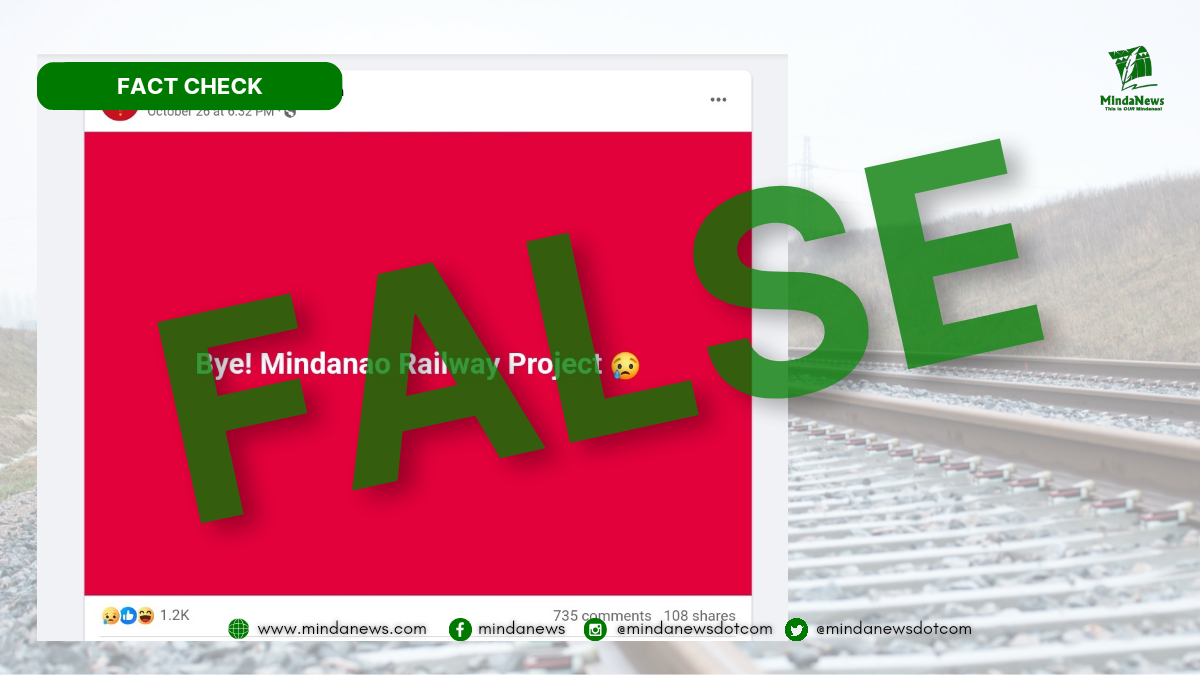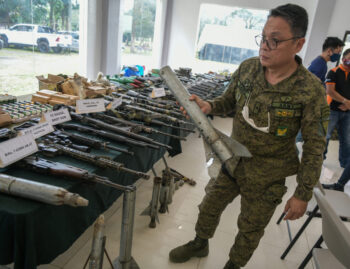
A Facebook post that claims that the Mindanao Railway Project (MRP) is now dead on its track is false.
Philippine Construction Boom posted Thursday a social media card that reads: “Bye! Mindanao Railway Project,” with a sad emoji accompanying it.
The misleading post came after reports came out that the Philippine government under President Ferdinand Marcos Jr. had dropped China as funder of the MRP, a key infrastructure project of former President Rodrigo Duterte, the first and only Mindanawon to win the presidency.
The construction of the MRP was a campaign promise of Duterte that failed to take off under his term (2016 to 2022) after China failed to submit a shortlist of contractors.
During his first State of the Nation Address on July 25 last year, Marcos pledged to continue the MRP, with a cost of P83 billion for the first phase covering the Tagum-Davao-Digos (TDD) segment.
But last Thursday, Transportation Secretary Jaime Bautista confirmed that the Philippine government will no longer seek funding from China for the construction of the MRP.
Bautista, however, did not say the construction of the Mindanao Railway Project will not continue, contrary to the claim of Philippine Construction Boom, which generated 1,223 reactions, 726 comments and 107 shares as of 9 a.m. Saturday.
Its Facebook page has 234,000 followers.
The MRP was supposed to be financed under Chinese official development assistance (ODA).
In a statement on Thursday, Oct. 26, Bautista said the Philippine government decided to drop China as financier for the MRP, but is looking for other lending sources.
“We will look for another funding source. We are working on that now,” Bautista said on the sidelines of the German–Philippine Chamber of Commerce & Industry luncheon meeting in Makati City on Oct. 26.
Apart from the MRP, the transportation chief said that two other Department of Transportation (DOTr) projects – the South Long Haul Project and the Subic-Clark Railway – were also dropped from Chinese ODA funding.
“Yun ang hahanapan namin ng additional funding or replacement (We will look for additional or replacement funding for those projects),” he said, adding that the DOTr has requested the assistance of the Department of Finance (DOF).
Bautista revealed the agency is eyeing funding from the Japan International Cooperation Agency, World Bank, or the Asian Development Bank.
The DOF had sent a letter to China informing them that the Philippines will not pursue the loan for the Mindanao Railway Project anymore, Bautista said.
In a letter to Chinese Ambassador to the Philippines Huang Xilian dated September 22, Finance Secretary Benjamin Diokno informed Beijing that the Philippine government is “no longer inclined to pursue Chinese ODA financing for the Mindanao Railway Project Phase 1-Tagum-Davao-Digos Segment.”
Bautista said the interest of China to fund the MRP and the two other railway projects has “waned.”
Tension between the Philippines and China has escalated over the dispute on the West Philippine Sea, which Beijing claims is a part of its territory. In 2016, the United Nations Permanent Court of Arbitration ruled in favor of the Philippines with regards to the WPS issue.
Asked if the rising tension between Manila and Beijing was to blame, the Transportation chief said, “Hindi naman (Not necessarily) because that problem has been there even before this tension in the West Philippine Sea,” a report by GMA News Online said.
According to DoTR, the TDD segment will reduce travel time from 3.5 hours to 1.3 hours between Tagum and Digos cities and will provide “passengers safe, fast, and reliable transport options on the TDD commuter line.”
The TDD segment is the first phase of the 1,550-kilometer Mindanao railway system that aims to connect the key cities of Davao, Butuan, Surigao, Cagayan de Oro, Iligan, Cotabato, Zamboanga and General Santos upon its completion.
As with all our other reports, MindaNews welcomes leads or suggestions from the public to potential fact-check stories.
MindaNews is a verified signatory to the Code of Principles of the International Fact-Checking Network. (Bong S. Sarmiento / MindaNews)








